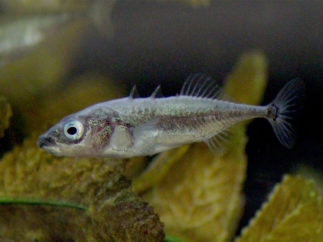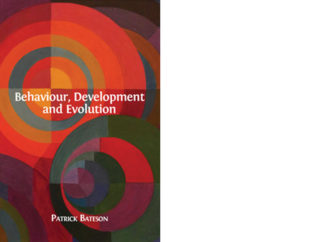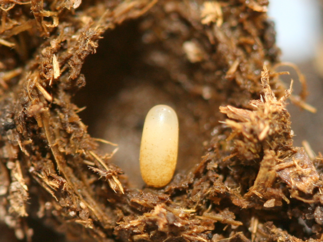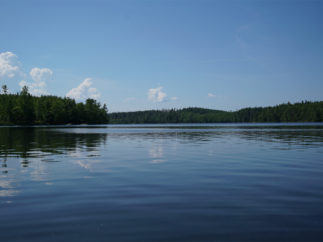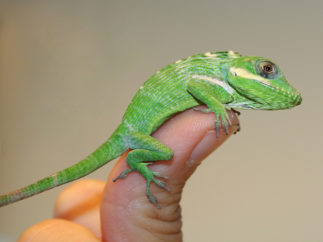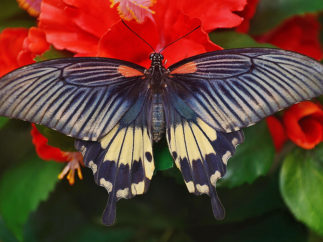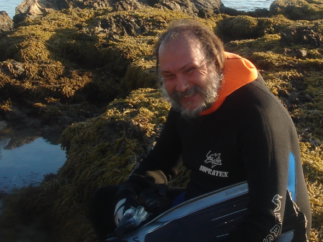Around ten years ago, in 2008 Massimo Pigliucci and Gerd Müller organized a workshop on the so-called Extended Evolutionary Synthesis at the Konrad Lorenz Institute (KLI) for theoretical biology in Vienna. This meeting resulted in their seminal edition Evolution: The Extended Synthesis. On May 11th to 14th the KLI hosted again a meeting on this topic, this time organized by Kevin Laland and Tobias Uller. It brought together a number of developmental and evolutionary biologists, as well as philosophers of biology.
Sticklebacks, selection shadows, and salinity shifts: phenotypic plasticity in novel environments
Phenotypic plasticity is the ability of one genotype to produce multiple phenotypes depending on external environmental conditions (see our slideshow for further information). It comes in many forms: from permanent developmental shifts in early life to ongoing, reversible behavioural responses to fluctuating environmental conditions. Although widespread, its role and importance in evolutionary dynamics is not yet fully understood.
Behaviour, Development and Evolution
In my latest book, Behaviour, Development and Evolution, I take a systems biology approach to understanding the evolution and development of behavior. Themes that run though the book are the adaptive processes that result in the appearance of design in nature; the active role of the organism in development and evolution; and an emphasis on whole systems to understand the complexity of development. I explore the frameworks that are often used to think about questions of development and behavior in both humans and animals and explain why the nature/nurture dichotomy is misleading.
Intelligent design without a creator? Why evolution may be smarter than we thought
Charles Darwin’s theory of evolution offers an explanation for why biological organisms seem so well designed to live on our planet. This process is typically described as 'unintelligent' – based on random variations with no direction. But despite its success, some oppose this theory because they don’t believe living things can evolve in increments. Something as complex as the eye of an animal, they argue, must be the product of an intelligent creator.
Research project 9: The evolution of inclusive heredity through the genomic interactions of symbionts
‘The evolution of inclusive heredity through the genomic interactions of symbionts’ is one of five research projects under the third theme, Inclusive Inheritance, of the Extended Evolutionary Synthesis research program. Michael Wade and Armin Moczek (both at Indiana University), are using theoretical models and experiments in dung beetles to investigate how the evolution of symbiotic host-microbiota interactions shape heredity.
Research project 7: The origins of organismal complexity
‘The origins of organismal complexity’ is one of six research projects under the second theme, Evolutionary Innovations, in the Extended Evolutionary Synthesis research program. Charlie Cornwallis and Per Lundberg, together with Karin Rengefors and Lars-Anders Hansson (all at Lund University), are investigating the origins of multicellularity.
A TVOL interview with Tobias Uller: Orchestrating the Extended Evolutionary Synthesis project
This View of Life (TVOL) is featuring a series of articles on the Extended Evolutionary Synthesis, based on a major grant from the John Templeton Foundation awarded to our team of scientists headed by Kevin Laland (St Andrews University) and Tobias Uller (Lund University). This interview with Tobias begins to introduce the empirical side of the project, including his own contribution. The grant as a whole is organized into four themes: (1) conceptual issues, (2) evolutionary innovation, (3) inclusive inheritance, and (4) evolutionary diversification.
Who’s afraid of the Extended Synthesis?
"A new scientific truth does not triumph by convincing its opponents and making them see the light, but rather because its opponents eventually die, and a new generation grows up that is familiar with it." So wrote physicist Max Planck, in his Scientific Autobiography and Other Papers, (1949, pp. 33–34). That's a bit drastic, perhaps, but there definitely is a kernel of truth in what Planck stated. Of course, if you happen to be on the other -- conservative, shall we say -- part of any given scientific debate you will turn to a very different sort of quote for solace, like this one perhaps: "The fact that some geniuses were laughed at does not imply that all who are laughed at are geniuses. They laughed at Columbus, they laughed at Fulton, they laughed at the Wright brothers. But they also laughed at Bozo the Clown" (Carl Sagan, talking about pseudoscience, in Broca's Brain, 1979, p. 64).
What evolutionary developmental biology (evo devo) brings to evolutionary biology
Evolutionary biology is a very vibrant and highly successful discipline. Since its reformulation during the modern synthesis it has successfully tackled many major questions and developed into a sophisticated, powerful framework. But it is important to emphasize that there are foundational questions in evolutionary biology, questions that have motivated evolutionary biology from its inception, that remain to be adequately addressed. ‘How do novel complex traits originate?’ is such a question. How does a major invention in evolution come into being in the first place? What are the baby steps of innovation?
A TVOL interview with philosopher Kim Sterelny: A conversation about the Extended Evolutionary Synthesis
David Sloan Wilson of This View of Life (TVOL) interviews Kim Sterelny, one of the world’s most prominent philosophers of biology. Sterelny has served as editor of the journal Biology & Philosophy since 2000 and his books include: Sex and Death: An Introduction to Philosophy of Biology; Thought in a Hostile World: The Evolution of Human Cognition; Dawkins vs. Gould: Survival of the Fittest; and The Evolved Apprentice: How Evolution Made Humans Unique.

